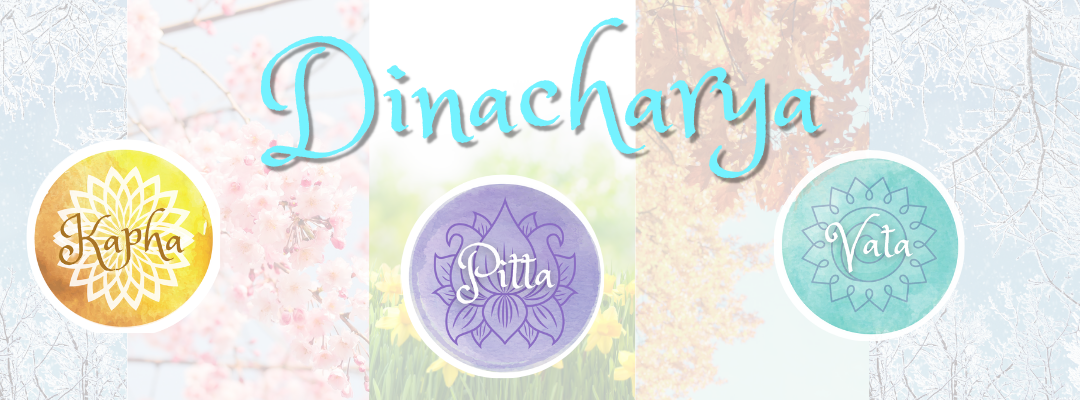
DINACHARYA IN ARYURVEDA - YOUR GUIDE TO HOLISTIC WELLNESS ROUTINE
Dinacharya in Sanskrit is derived from two words: "dina" which means "day", and "charya" means "activity". Ayurveda encourages establishing our holistic wellness ritual.
To maintain a balanced health, a wellness daily routine is essential incorporating physical, mental, and spiritual practices. Ayurveda contends that these rituals help us restore and maintain equilibrium, promoting health.THE DAY'S CYCLES AND TIMES:
Because Ayurveda treats us as the nature's interplay, Dinacharya is practiced according to how Ayurveda looks into the cycles of nature and bases on the changes of the environment.
A day consists of 2 cycles: the sun cycle for the daytime, and the moon cycle which starts after sunset.
For each cycle of the day, each Dosha dominates a 4-hour period. It is believed that these specific hours of the day contain a dominant energy governed by one of the Doshas: Kapha, Vata, and Pitta; as it is believed the we also have these energies within our body in various strengths and combinations - the reason why Ayurvedic Gurus have designed such wellness routine lifestyle to focus on each dosha at its prime hours (when it is most powerful within and around us. 4-hour periods dominated by Vata, pitta or kapha energies. Similarly, it is an advantage for us to know what activties and food to avoid to prevent aggravating the cycle of each dominant dosha at specific time of the day.
Sun Cyle of the Day: Sunrise to Sunset
- 6 AM to 10 AM - Kapha
- 10 AM to 2 PM - Pitta
- 2 PM to 6 PM - Vata
Moon Cycle of the Day: Sunset to Sunrise
- 6 PM to 10 PM - Kapha
- 10 PM to 2 AM - Pitta
- 2 AM to 6 AM - Vata
DINACHARYA
-
Wake-up Time: It is advised in Ayurveda to wake up before sunrise - getting up early brings you the feeling of freshness and lightness.
-
Prayers: The flow of Sattva Guna is believed to be most active in the morning. Sattva is one of the Gunas (mode of existence) and Sattva Guna focuses more on purity and wisdom. In the morning, it produces good thoughts throughout the day. Gurus of ancient times of India up to today's generation's, offering prayer before getting out of bed is a shorter form of meditation.
- Hydration & Evacuation: Drink a glass or two warm water for your digestive and elimination aid. It will help you empty your bowls without straining. Keep a healthy lifestyle to regularly move your bowel daily.
-
Personal hygiene: Wash your face with water & clean your eyes. This refreshes your mind and body.
-
Oral hygiene: Brush your teeth by using toothpaste which is astringent, pungent or bitter in taste. Traditionally neem stick or licorice stick was used as toothbrush.
-
Scrape your tongue: Tongue scraper should be made up of metal like gold, silver, copper, or brass. It removes bacteria and better the appearance of your tongue. It also improves your sense of taste by removing plaque/coats from the tongue.
-
Gargle: For gargling, use sesame oil (Tila tel). It gives strength to the jaws, teeth will not be set on edge by sour intake. This will help to get good taste of food and oil will give unctuousness to throat
-
Nasya: Application of Nasal oil: Put 3 to 5 drops of Anu Taila or ghee into each nostril in the morning. This inhalation helps to lubricate the nose, clears the sinuses, voice becomes sweet, gives clear vision. Nose is the door to the brain and application of nose drops nourishes Prana and gives strength to sense organs.
-
Abhyanga or Self Massage : Apply oil on head regularly releases headaches, stress, hair becomes smooth strong and person does not suffer hair loss, graying of hair.
- Ayurvedic Facial Brightening Kansa Oil - specially formulated with Ayurvedic ingredients to nourish all three types of Dosha: Kapha, Vata, and Pitta which brings holistic benefits to both the mind and body.
- The Marma Wand (On-the-Go) - The smallest of our Kansa wand collection and is specifically used for facial and neck massage. With the Ayurvedic facial oil, the Kansa wand can easily glide on the skin targeting Marma points. This is your ultimate Ayurvedic facial duo for your lymphatic drainage massage and any form of Abhyanga you love.
-
Body Massage: Massage is very beneficial to skin use sesame oil or coconut oil. Body becomes smooth skinned, strong, prevents the signs of aging and gives good tactile stimulation. Daily massage will help to reduce stress, fatigue.
-
Bathing: Bathing not only does it clean our body on the surface but it also purifies our mind. Bathing helps us removes sweating, fatigue, dirt; and helps us maintain our holistic hygiene. It refreshes not only the body, but also our mind and spirit. It boosts our energy and increases Ojas. After bathing, it is advised to wear clean clothes of calming colors - we dress up nicely to lift our mood and vibe.
-
Exercise: Exercise lightly after taking a bath. The type of exercise should be based on your capacity and body/doshic constitution. Yoga Asanas can be performed along with Sun salutations. This improves flexibility of the body and improves the mental capacity.
-
Physical exercise brings about lightness, stability and stimulates the digestive fire. Exercise daily to half of your capacity, which is until sweat forms on the forehead, armpits, and spine.
-
Meditation: Pranayama is the practice of breath control in Yoga. It improves our mental power as we meditate and practice controling our breathing synchronizing with Yoga Asanas. Meditation in the morning are the key to healthy body & mind. It improves our ability to focus. It calms the mind, gives strength to the mind, and releases stress. It nourishes all three Doshas and keeps the balance.
-
Healthy Diet: We should lead a mindful lifestyle by prioritizing what food we let get into our system (body) as it affects our overall health. Maintain a good habit of eating food on time. Eat breakfast early, and lunch around 12 noon, then dinner around 6 to 7pm. Avoid going to bed immediately after dinner. Choose the right food and eat fresh fruits and vegetables, shad rasatmak (Include all 6 tastes) sattvik food.
- Do not eat before your previous meal is digested. It will overload your Agni.
- Avoid eating when emotionally disturbed like after fight, anger, stress, grief. Do not eat stale, leftovers, frozen foods.
- Don't rush eating, or while running as it aggravates your Agni (digestive fire) which causes diseases if left neglected.
- Always remember that a nourished Agni embodies a healthy lifestyle. This helps you keep your everyday inner balance all day long.
-
Sleep: Sleep is our health's sanctuary. When our mind and body get exhausted (along with sense organs), we sleep to restore our strength and heal.



